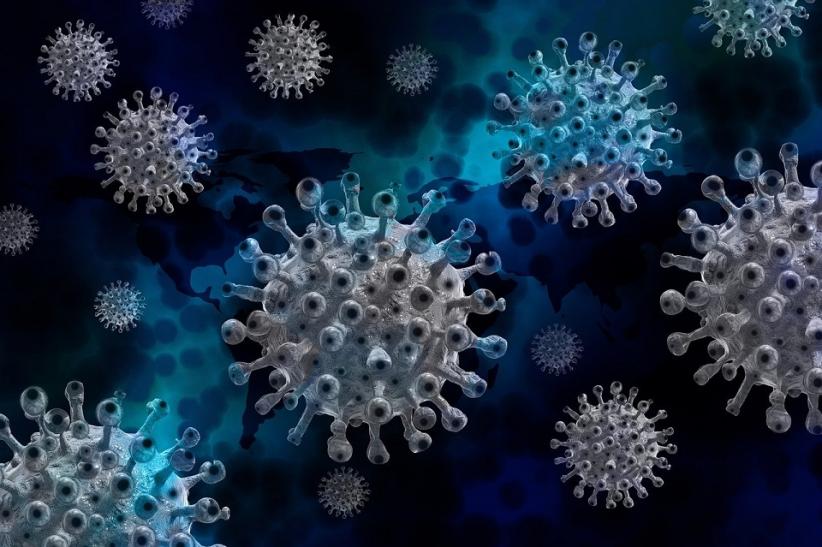Designing a nanovaccine based on recombinant proteins of SARS-CoV-2 virus covalently bonded on nanoparticles
A team of WUT researchers at the Faculty of Chemical and Process Engineering and Centre for Advanced Materials and Technologies, and a team of immunologists are jointly working on devising a nanovaccine based on recombinant proteins of SARS-CoV-2 virus covalently bonded with biodegradable nanoparticles of iron oxide. The research is implemented as part of the competition for research grants IDUB against COVID-19.
SARS-CoV-2 virus and its consequences
The epidemic of COVID-19 caused by coronavirus SARS-CoV-2 broke out in autumn 2019 in China. Having spread all over the world, the epidemic has affected millions of people. The collapse of the healthcare system provoked by a huge number of Covid-19 infections has resulted in a significant increase in medical complications and deaths caused by other diseases. The world economy has been hit by a huge economic crisis caused by the pandemic, which is a consequence of worldwide uncertainty and slowdown in production and transport. The social costs of the COVID-19 pandemic are enormous and are constantly growing. It is difficult to predict the future of the pandemic – the disease will either disappear in a few years, like local epidemics caused by other coronaviruses (SARS, MERS), or will return with new waves of infections, causing numerous deaths and fear, and paralysing the world economy. Judging by the scale and dynamics of the pandemic, it should be stated that the virus will not disappear by itself and this dangerous phenomenon will recur, producing even more dangerous viral strains. Therefore, it seems that the only solution to the problem is to devise an effective vaccine with a global application and create systemic solutions facilitating dynamic and effective counteraction against such threats in the future.
Promising results
The project aims to design a simple, low-cost production vaccine based on recombinant viral proteins produced in a bacterial expression system, and propose a method of quick design and production of vaccines against the viral mutations and new viruses, or bacteria which may appear in the future.
Supported by many years of experience and knowledge gained in the fields of genetic engineering, chemistry, industrial biotechnology, and nanotechnology by the project authors, researchers have successfully obtained three variants of recombinant proteins of the COVID-19 viral shell (epitopes) displaying the highest immunogenicity according to the latest scientific updates. Researchers have also successfully decorated biocompatible and biodegradable nanoparticles with the obtained recombinant SARS-Cov-2 epitopes.
In the first stage, fragments of viral proteins were chosen - epitopes from S1, S2 domains. It was of crucial importance to the researchers that the epitopes were stable in terms of mutations and facilitated provoking a strong and durable immune response.
Selected fragments of coding sequences of the viral shell protein (spike) were cloned and introduced into a proprietary prokaryotic expression system, and then placed in E. coli bacterial strains.
The obtained recombinant proteins were isolated, purified, and covalently bonded with biodegradable nanoparticles of iron oxide. Both nanoparticle itself and the shell act as an adjuvant, additionally strengthening the immune response.
Nanovaccines obtained this way, consisting of nanoparticles decorated with recombinant proteins of the viral shell, will be tested on human cell lines, and then on animals. It is worth mentioning that the viral proteins themselves may act as an effective vaccine with appropriate additions. After administering the vaccine to mice, its toxicity, as well as the degree and permanence of the immune response will be tested by determining the number of antibodies.
A research approach involving a simultaneous application of numerous immunogenic epitopes and multivalent nanosystems of their delivery to the body increase the chance to provoke an effective and durable immune response. Nanoparticle-based vaccines show promising results due to the lack of toxicity, and at the same facilitate the delivery of an antigene to antigene-presenting cells and this way ensure effective learning and stimulation of the immune system.
Currently, there are no nanosystems on the vaccine market which utilise the technology of covalent bonding of one or more epitopes on the surface of a nanoparticle.
At present, the team is working on the purification of the proteins and is preparing for tests on animals. At the same time, we are also looking for an industrial partner interested in vaccine production. The partner should become involved in the process of creating the vaccine as soon as possible, as it will tremendously accelerate this process.
The research team: Tomasz Ciach, Prof. Ph.D., D.Sc (project manager), Anna Mazurkiewicz-Pisarek, D.Sc., Jakub Trzciński, D.Sc., Alina Mazurkiewicz, M.Sc.
Source: based on resources provided by Tomasz Ciach, Prof. Ph.D., D.Sc


